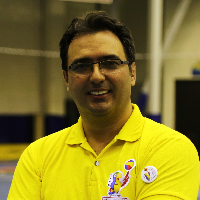Selected Rainbow Parachute Games on Motor Development of Autism Spectrum Disorder Children
Fundamental motor skills are basic skills necessary for movement competence and considered the basic building blocks for more complex motor skill development. However, autistic children have significant delays in fundamental motor skills. Additionally, motor impairments in autistic children can have a negative impact on other developmental aspects of them like social communication and social interaction skills in this population. With regard to the marked differences in developmental aspects between children with autism spectrum disorder and normal children, it is recommended to develop interventions or games requiring whole body exercises for children with autism spectrum disorder to improve their gross motor growth. Rainbow parachute is one of the most popular active play toy used recently in kindergartens and playhouses to carry out various types of active play programs. It seems that this toy has the indices needed to design the motor games of children with autism spectrum disorder. It seems that this toy instrument has the indices needed to develop active games for children with autism spectrum disorder. The present study aimed to determine the effect of selected Rainbow parachute games on motor development of autistic children. The parachute is a multicolored, nylon sheet used by arranging children on the outside. That is commonly used in kindergarten and elementary school physical education classes. The aim of this study was to survey the effect of selected rainbow parachute games on motor development of autism spectrum disorder children.
This study was quasi–experiment. 20 autistic children (4 to 6 years old) from two rehabilitation centers of Tehran city (capital city of Iran), based on their pre–test scores randomly were selected and divided into two groups, control (n=10) and experimental (n=10). Test of gross motor development–2 Ulrich (TGMD–2) was used to assess the motor development. TGMD–2 is one of the reliable tools for evaluating development of gross motor skills; that was provided by Ulrich (1985) in the United States of America for the first time and reported its stability and justifiability for 3–10 years old American children. The test reliability was 96% and the stability was 87%. The test included six displacement skills (running, trotting, hopping, skipping, jumping, sliding) and six object control skills (striking a stationary ball, stationary dribble, catch, kick, overhand throw and underhand roll). Running pretest, the experimental group played selected parachute games for 8 weeks (2 sessions per week each 45 min.). Each session started at 10 a.m. and was divided into 3 sections: (a) warm–up activities: 10 min.; (b) selected parachute games: 25–min; (c) cool down activities: 10 min. The main focus of the program was on developing fundamental motor skills but developing physical fitness by modifying the intensity, duration and complexity of the activities was also considered. The program was developed based on rough–and–tumble play, running around, and other physical play that provides whole–body exercise and helps the child develop gross motor skills. During games, all experimental children had the experience of interacting with other each other and objects in their surroundings. One head coach managed sessions and three qualified trained assistants. At the end of the play program, pretests were re–performed in both experimental and control groups. Data were analyzed using analysis of covariance, Shapiro–Wilk test and Levin tests by statistical package of SPSS (version 17) at a significance level of 0.05.
The results showed that selected parachute games significantly affected running (p=0.011), skipping (p=0.042), hopping (p=0.033) and jumping (p=0.026) skills from the displacement scale and striking (p=0.033), throwing (p=0.032) and rolling (p=0.044) from object control scale. In addition, results showed that the intervention did not have significant effect on remained subscales of displacement and object control scales.
The results revealed that the selected rainbow parachute games, which have been developed according to fundamental motor skills, could improve some subscales of displacement and object control scales in children with autism spectrum disorder. Therefore, it seems that engaging in physical activity programs by rainbow parachute games resulted in greater sensory integrity and more environmental information, which may increase brain activity and improve bilateral coordination in children with autism spectrum disorder. Exercise may improve motor skill in individuals with autism by strengthening whole muscle, enhancing motivation through improvement in self–esteem, and using cognitive techniques to sharpen the child ability in a new task. We encourage mentors to use rainbow parachute games to improve motor development of children with autism spectrum disorder.
- حق عضویت دریافتی صرف حمایت از نشریات عضو و نگهداری، تکمیل و توسعه مگیران میشود.
- پرداخت حق اشتراک و دانلود مقالات اجازه بازنشر آن در سایر رسانههای چاپی و دیجیتال را به کاربر نمیدهد.


